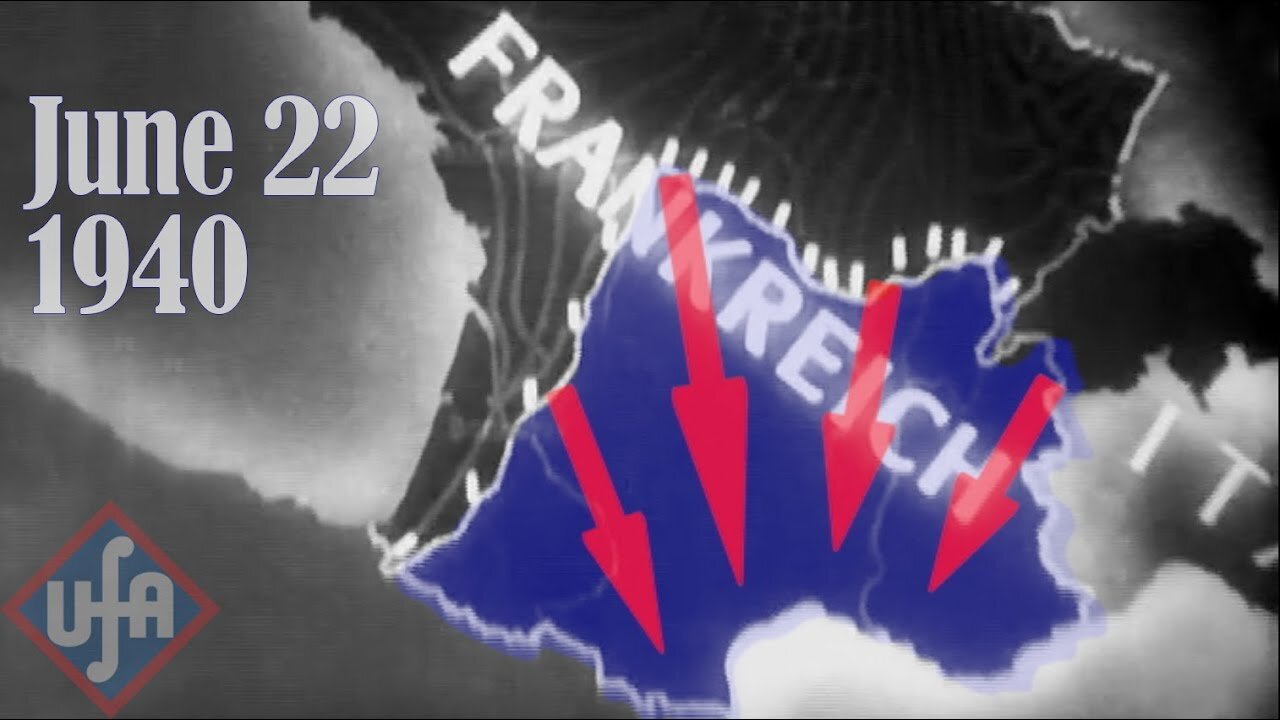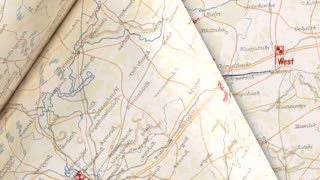Premium Only Content

Germany wins the war in 1940? British naval attack on French at Mers-el-Kabir and what it meant
With the French surrender to the Germans at Campaign on June 22, 1940 the British found themselves in a precarious position. Although they’d successfully managed to evacuate 338,000 soldiers, 1/3 of them being French, from the beaches of Dunkirk, had the Germans followed up quickly with a successful landing operation in Britain the war would have been decided.
While the British were aware of the deteriorating military situation in France and engaged in discussions with French leaders, they did not have complete knowledge of the conditions of surrender prior to the actual signing of the armistice. Their only advantage was the superior Royal Navy.
For Churchill and his War Cabinet, the risk of the French war ships, the second strongest navy in Europe, falling into enemy hands was paramount. On July 3, James Sommerville, the British commander of Force H, passed on the following signal to French Admiral Gensoul at Mers-el-Kabir:
"It is impossible for us, your comrades up to now, to allow your fine ships to fall into the power of the German or Italian enemy. We are determined to fight on until the end, and if we win, as we think we shall, we shall never forget that France was our Ally, that our interests are the same as hers, and that our common enemy is Germany….
It continued giving three options
1. To join up and continue the fight against Germany
2. sail to a British port and hand over the assets, the crews would then be repatriated
3. sail them to a French port in the West Indies and have them demilitarized.
It finished stating - If you refuse these fair offers, I must, with profound regret, require you to sink your ships within 6 hours. Finally, failing the above, I have the orders from His Majesty's Government to use whatever force may be necessary to prevent your ships from falling into German or Italian hands."
The French themselves were in a predicament. Their army had been humiliated and in some quarters it was even being said that the Jews were responsible. That they were the cause of the rot from within which lead to the otherwise inexplicable collapse. This played into the German hands by paving the way for many French to actively join their cause. If you can’t beat them, join them.
Regarding the French fleet, the newly signed armistice stipulated that the fleet would be largely disarmed and confined to its harbors remaining under French control. Agreeing to any of the options offered by the British would have been a clear breech in the terms of the armistice and could lead to the resumption of hostilities which would result in the occupation of the remainder of the country.
French Admiral Gensoul replied in writing to what was seen as a British ultimatum that under no circumstances would his ships fall into German or Italian hands and, ominously, that force would be met with force.
A little after 1pm, the British dispatched Swordfish planes, from the carrier Ark Royal, to mine the harbor entrance. This action angered Gensoul, who felt the British were acting in bad faith. At 4:45 pm Somerville received a communiqué from the Admiralty, that he had "to settle matters quickly" as French reinforcements were on their way.
He wasted no time. At 5:15 pm, Somerville sent this message to the battleship Dunkerque The French failed to respond, the negotiations had failed.
Then the first salvo from the Hood’s fifteen inch guns smashed into the side of the French battleship Bretange, causing fatal damage. For fifteen minutes, H Force’s guns ranged down on the French fleet in the harbor, causing death and destruction. The French had been badly mauled.
But was it the French or the British that had lost the most in this action? Actually, although not directly involved, it was probably the Germans. Should the Germans have managed the end phase of the war against France differently?
With the successful completion of the campaign in the West, in Berlin and in most other capitals, it was expected that the war would soon be over. Britain couldn’t possibly hope to continue on alone. In order to ensure their Empire they’d have to come to terms with Germany’s dominance on the continent. This British operation showed that they were willing to go it alone.
The decision to negotiate the armistice allowing Vichy France to be self governed and maintain possession of their fleet, was intended to allow Germany to only need to keep a relatively small military presence in occupied France - which it did. This would free up the majority of the German Wehrmacht to wage war against the Soviet Union; in Hitler’s mind, a massive struggle in defense of Western civilization.
Had Germany better understood Britain’s motivations, the end of the war against France could have been handled differently. Would fully defeating France and occupying the entire country have left Germany in a more advantageous position to win the current war against Britain rather than looking ahead to the next war?
-
 8:21
8:21
Military1945
4 days agoWar diary from a platoon leader from the SS Div. Reich (mot) during the advance on Moscow - Part 10
688 -
 1:37:26
1:37:26
The Officer Tatum
2 hours agoLIVE Rachel Maddow, Don Lemon MELTDOWN Over Joy Reid's FIRING! + More Ep 68
4.95K5 -
 UPCOMING
UPCOMING
The Gateway Pundit
25 minutes agoEpstein & JFK Files BLOCKED: Luna’s SHOCKING Clash with Pam Bondi! | Elijah Schaffer & Jim Hoft
-
 2:03:21
2:03:21
The Quartering
3 hours agoDan Crenshaw Hot Mic Threat, Jake Paul Endorses Vivek, and Kathleen Kennedy Leaves Lucasfilm
30.1K17 -
 LIVE
LIVE
Viss
5 hours ago🔴LIVE - Precision Guided & Strategic PUBG Tactics!
201 watching -
 1:06:58
1:06:58
The White House
3 hours agoPress Secretary Karoline Leavitt Briefs Members of the Media, Feb. 25, 2025
28.3K21 -
 1:34:46
1:34:46
Russell Brand
3 hours agoControl Slipping: Germany’s Vote, Ukraine, Apple, and Joy Reid – SF543
74K22 -
 57:44
57:44
Winston Marshall
3 hours ago“They Were Hiding THIS!” Michael Shellenberger UNCOVERS Dark Secret About USAID and The Deep State
25.8K14 -
 50:59
50:59
Michael Franzese
1 day agoAmerica’s Biggest Issues EXPOSED by Tomi Lahren
38.8K13 -
 2:55:16
2:55:16
The Dana Show with Dana Loesch
3 hours agoDOGE LAYOFFS FACE BACKLASH | The Dana Show LIVE On Rumble!
15.2K6